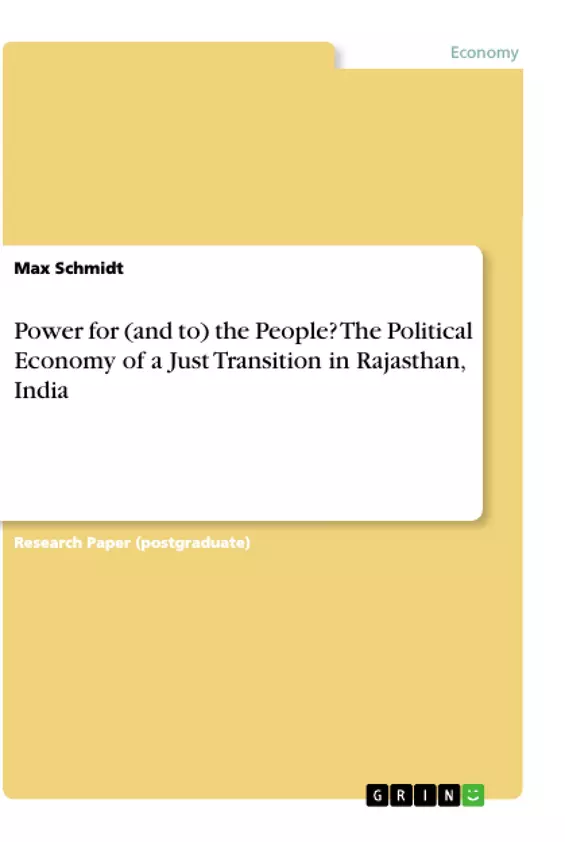This paper examines the following research questions: Who wins, who loses, how and why from a Just Transition (JT) in Rajasthan towards a higher share of renewable energies, in particular solar energy? How can the Republic of India reconcile its self-set and international goals of overcoming absolute and energy poverty as well as increasing energy security with current practices of training for and employment in the (renewable) energy sector? Which role do non-state actors play in India’s renewable energy sector to overcome these development challenges?
In times of an accelerating climate change (CC), the Republic of India – like most other states of the Global South – is confronted with ever more developmental challenges. They are, however, particularly intertwined in the Indian context. Not only is the South Asian giant one of the world’s most climate-vulnerable countries, understandable as “the degree to which a system is susceptible to, or unable to cope with, adverse effects of [CC], including climate variability and extremes”, in addition, 22% of its population still lives beneath the international absolute poverty line of USD 1.90 per day. Confounding this, 168 million people, or 24% of the population, were classified as living in energy poverty, particularly in rural areas, in 2017.
Crucially, these numbers neither imply that the remaining 76% of India’s population enjoy a high degree of energy security nor that these development aspects are highly distinct from each other. The opposite is more likely to be the case, considering the threat of CC to reinforce and deepen already existing inequalities. Furthermore, and exacerbating the prevalence of energy poverty when looking to the future, the world’s second-largest nation is still severely dependent on coal and other fossil fuels. As much as 63% of its electricity are generated by combusting highly climate-damaging fossil sources of energy such as coal
of which it possesses the fourth-largest reserves worldwide.
Inhaltsverzeichnis (Table of Contents)
- Rationale
- Literature review
- The energy-poverty-nexus
Zielsetzung und Themenschwerpunkte (Objectives and Key Themes)
This research proposal aims to explore the potential of renewable energy, specifically solar energy, to contribute to a just transition in Rajasthan, India, while considering the interconnected challenges of energy poverty, climate change, and sustainable development.
- The relationship between energy poverty and sustainable development in India.
- The role of renewable energy, particularly solar power, in addressing energy poverty and climate change.
- The concept of a just transition and its relevance to the expansion of renewable energy in Rajasthan.
- The political economy of just transitions and the challenges of achieving equitable and sustainable development.
- The impact of large-scale solar energy projects on local communities and the potential for job creation in the renewable energy sector.
Zusammenfassung der Kapitel (Chapter Summaries)
The first section, titled "Rationale," provides a comprehensive overview of the multifaceted challenges facing India in the context of climate change, energy poverty, and sustainable development. It highlights India's dependence on fossil fuels, the potential for renewable energy expansion, and the need for a just transition. It uses data and statistics to illustrate the urgency of addressing these issues.
The second section, "Literature review," delves into the existing research on the energy-poverty nexus, specifically focusing on the lack of a universally accepted definition and the complexities of achieving energy access. This section also sheds light on the historical context of the issue and the emergence of energy poverty as a critical concern within the framework of sustainable development goals.
Schlüsselwörter (Keywords)
The research focuses on the intersection of key concepts such as energy poverty, climate change, just transition, sustainable development, renewable energy (particularly solar power), political economy, and the specific context of Rajasthan, India.
Frequently Asked Questions
What is a "Just Transition" in the context of Rajasthan?
It refers to an equitable shift towards renewable energy, specifically solar power, that considers the social and economic impact on local communities.
How prevalent is energy poverty in India?
As of 2017, approximately 168 million people (24% of the population) were classified as living in energy poverty, particularly in rural areas.
Why is India still dependent on coal?
India possesses the world's fourth-largest coal reserves, and currently, about 63% of its electricity is generated from fossil fuels.
What role do non-state actors play in India’s renewable sector?
Non-state actors are crucial in overcoming development challenges, providing training, and implementing solar energy projects at the local level.
How does climate change exacerbate inequality in India?
Climate change reinforces existing inequalities as the most vulnerable populations often lack the resources to cope with its adverse effects.
- Quote paper
- Max Schmidt (Author), 2020, Power for (and to) the People? The Political Economy of a Just Transition in Rajasthan, India, Munich, GRIN Verlag, https://www.hausarbeiten.de/document/978866


